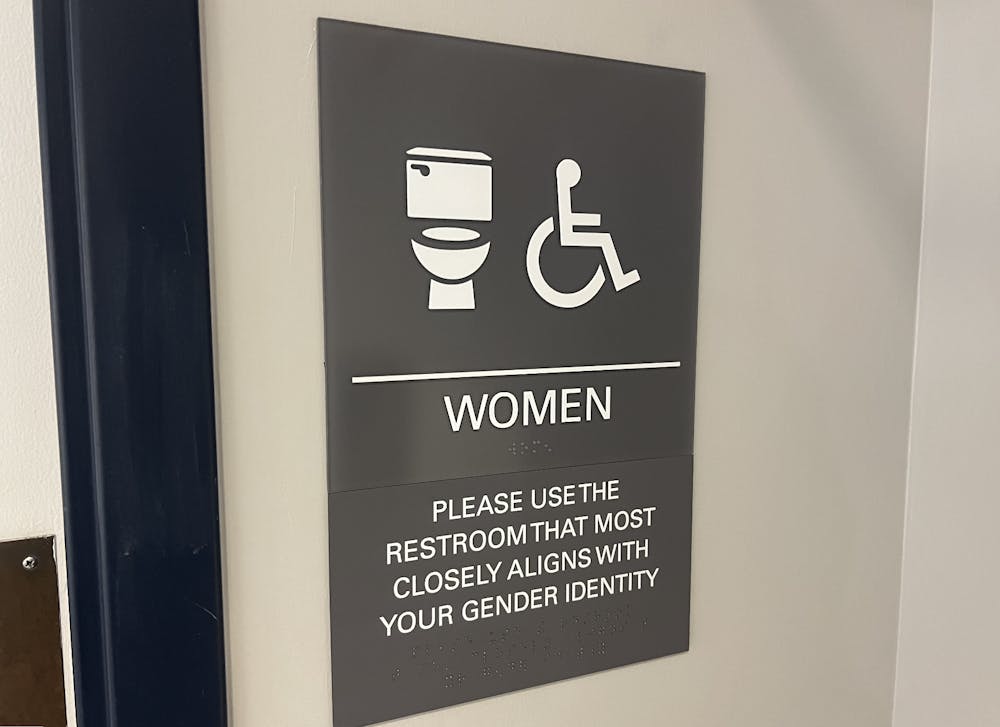By Isabella Darcy
Arts & Entertainment Editor
The College implemented new bathroom signs in four academic buildings last month in an effort to promote inclusivity. The initiative came to fruition through efforts of a working group of faculty, staff, students and student representatives from PRISM, the College’s gender and sexuality alliance.
The new restroom signs have pictogram images of the facilities inside that particular restroom, instead of a woman or man, along with another sign which directs people to use the restroom that most closely aligns with their gender identity. The Art and Interactive Multimedia Building, Music Building, Kendall Hall and some of Roscoe West all have new signs.
“Gender neutral bathrooms aren’t always available, so the main goal is to make sure that there’s a comfortable environment for whatever bathroom you choose,” said Liv Kelly, a junior biology major and representative of PRISM who was a part of the restroom signs working group. “One advantage of having gender neutral bathrooms is some privacy and comfort.”
For restrooms that are not single-use, separate facilities must be provided for each sex in order to be in compliance with policy 7.21.4 of the National Standard Plumbing Code. There is, however, an exception that would allow more than one sex in a non-single use restroom.
“Separate facilities shall not be required when rooms have separate fixtures designed for use by both sexes and the water closets are installed in privacy compartments,” exception five of policy 7.21.4 states. “Urinals shall be located in an area that is visually separated from the remainder of the room or each urinal shall be installed in a privacy compartment.”
With the necessary requirements to make a non-single use restroom gender-neutral, many bathrooms that already exist at the College cannot bear the label “gender-neutral.” Additions would need to be installed to them, which could be expensive and time consuming. Because building new bathrooms can be difficult, the College’s goal is to make the bathrooms that already exist more inclusive by changing the signs, according to Kelly.
“I think that this change for the bathrooms is good for students who previously might have been unsure of which bathroom they were allowed to enter,” said Inbar Strauss-Kirshner, a sophomore sociology major.
When traditional women’s and men’s bathrooms do not fully align with a person's gender identity, ostracization is a possibility.
“A thing that happens for a lot of trans people is they’re not comfortable using the bathroom with the gender that they were assigned at birth because that’s not who you are, but they’re also not comfortable using the bathroom that corresponds to their gender because they’re not comfortable with the alienation,” said Kelly.
Hate crimes in public restrooms against transgender and gender non-conforming individuals are an ongoing issue. In February, Nex Benedict, a 16-year-old non-binary high school student, died by suicide the day after being attacked by a group of their classmates in a girls’ restroom.
Using non-gender-neutral bathrooms can be risky and nerve-wracking for people who are not cisgender because of potential threats.
“[The bathroom signs initiative] is good,” Kelly said. “I’m not sure how much it does in terms of safety, because ultimately when it comes down to it, the main thing is the social environment is the most important part.”
With the exception of Roscoe West, all of the buildings with new bathroom signs primarily house classes under the School of Arts and Communication. Those taking classes under the schools of Business, Humanities and Social Sciences, Education, Engineering, Nursing and Health Sciences, and Science have less access to inclusive restrooms.
“It isn’t really fair if an arts major student has more inclusive bathrooms than a STEM major student,” said Kelly.
Some students pointed out some issues that they have with the bathroom signs initiative.
“It feels kind of performative,” said Joshua Gorman, a senior marketing major. “What is it actually doing?”
The restroom sign group, which was organized by Campus Planning, began meeting in November 2022, according to Head Media Relations Officer Luke Sacks. Some students believe that the College should be channeling its energy and resources into other initiatives.
“I wish the same level of effort was put into providing women's sanitary products, but unfortunately that initiative was shut down,” said sophomore chemistry major Hannah Fuschetto.
In December 2023, the College’s administration chose not to move forward with a pilot program that would have placed menstrual products in bathrooms around campus. The administration's reasoning for rejecting the program was budget cuts.
“If they want to make a real difference, bathroom signs are not the way to go,” Fuschetto said.
The working group is no longer meeting to discuss replacing bathroom signs around campus, according to Kelly. However, “signs will be replaced around campus as needed,” said Sacks.
“The small change is able to help students feel more comfortable at TCNJ and makes it easier to find bathrooms for everyone who needs one,” said Strauss-Kirshner.







